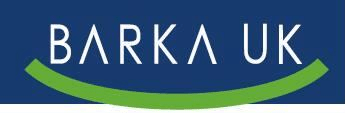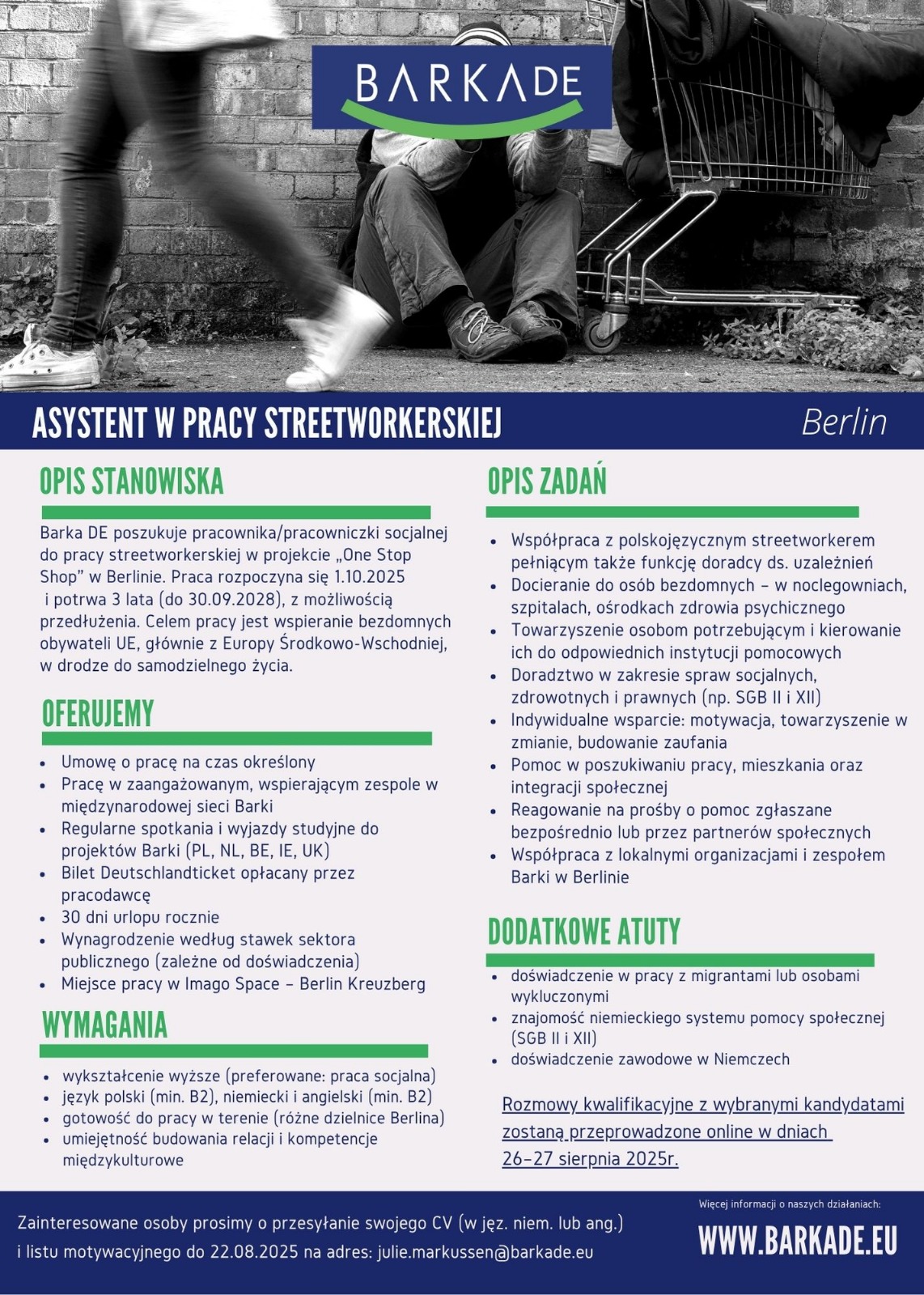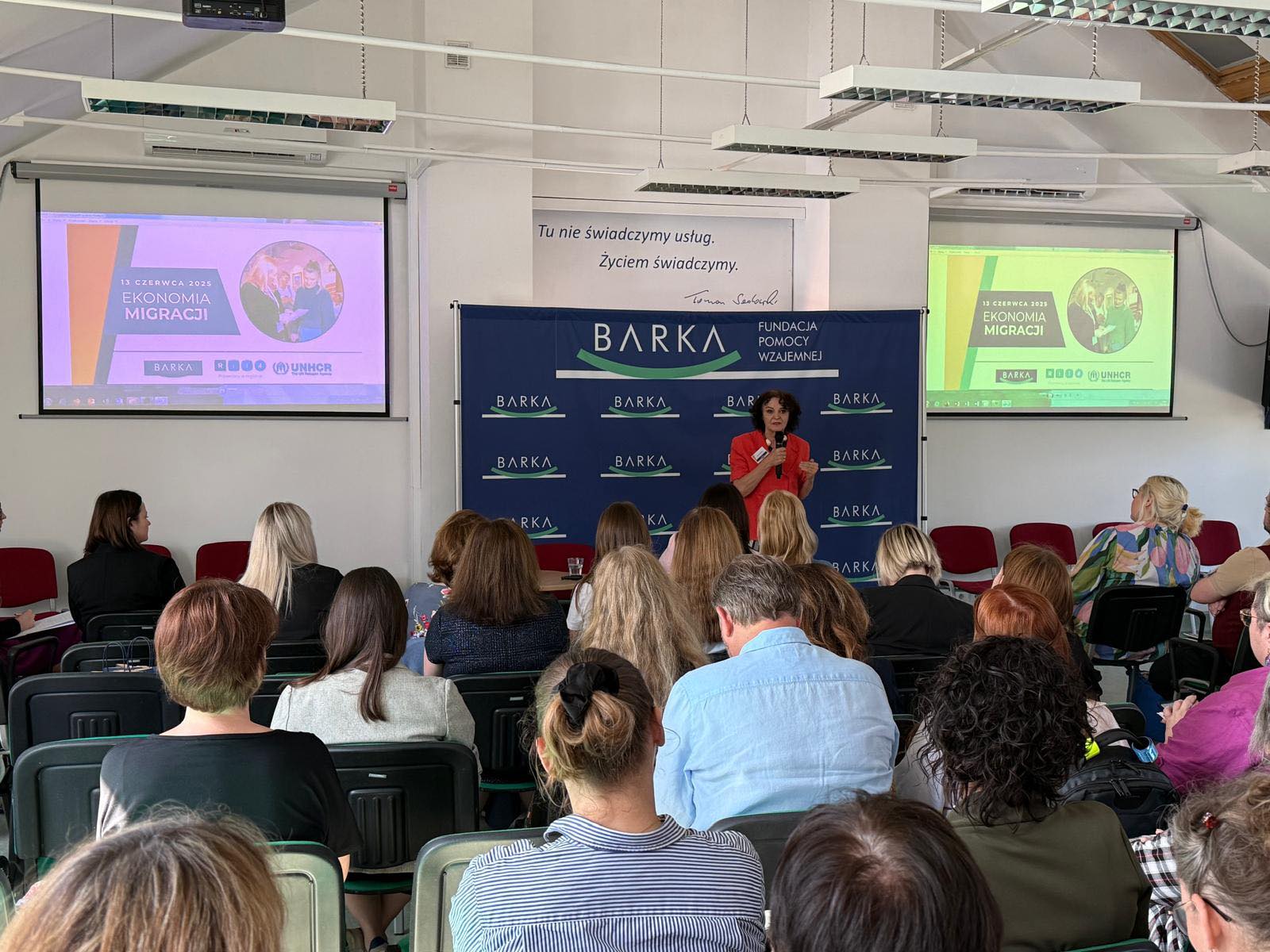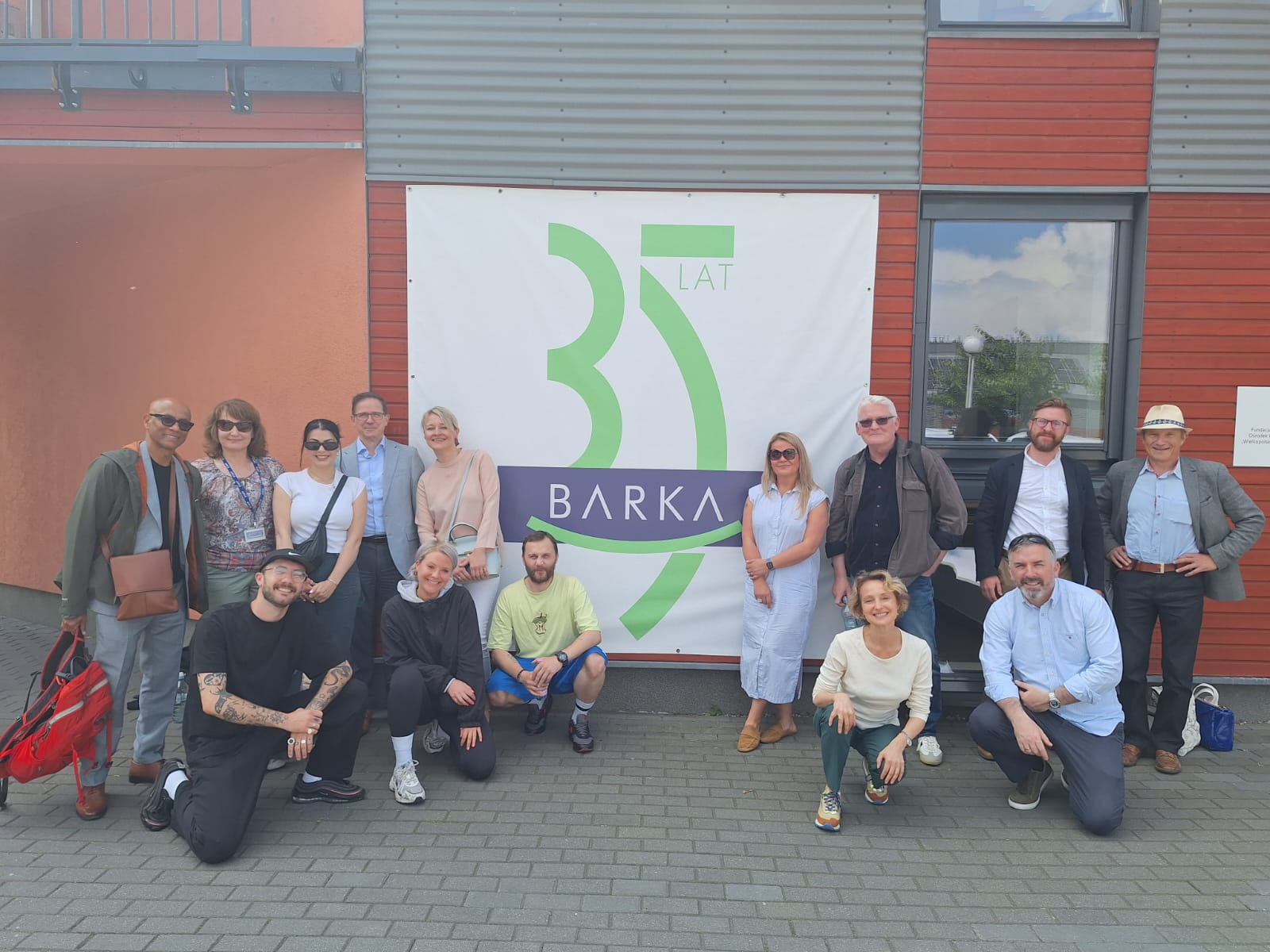Between 10th and 14th October 2022, a delegation from one of the largest non-UK national prisons visited Barka Network in Poland. This is the report.
We arrived in Warsaw on Saturday 08.10.22 at lunchtime with the intention of doing a little sightseeing prior to our very busy schedule starting on Monday. We spent the rest of Saturday and most of Sunday exploring the area close to our hotel and the old town which was very impressive with many historical buildings.
However, the main purpose of our visit was to meet with the BARKA Foundation. Barbara Sadowska co-founded BARKA (meaning LIFEBOAT) with her husband Tomasz Sadowski in 1989. They were both psychologists and recognised that a whole section of Polish society (the forgotten and unwanted) was being ignored, the Homeless, the ex-Offenders, those with substance addictions and the long term unemployed. The Barka philosophy is to work with people and teach them how to become self-reliant by providing them with the means to do this, so not only being concerned with their physical needs but also providing them with the skills to become self-sufficient, teaching them basic life skills.
Barbara & Tomasz approached the Polish government for support and funding and sold their idea to create communities where people lived and worked together and became families to one another. The project has grown and spread its wings, it now comprises of 12 communities, housing and supporting up to 500 residents at any one time, they have reconnected approximately 25,000 people, they have links to other organisations doing similar work in Romania, Albania, North Macedonia, Czech Republic, Holland, Norway, Germany among other countries.
MONDAY 10TH
After checking out of our first hotel we were collected from our hotel at 09:30 by Ewa Sadowska, Barbara Sadowska and Andrew Keogh from the BARKA Foundation. We were taken to RAKOWIECKA 37 to meet with General JaceK Kitlinski and the Heads of Central Prison Management, they had prepared a presentation for us that told us about the Prison service in Poland. Including.
Poland has 103 Prison/Detention centres
Approximately 73,000 Prisoners in custody
Approximately 23,000 Uniformed staff including Nurses, and 634 Psychologists who are also Officers
There are 3 categories of Prisons; Open, Semi-open and Closed
Closed and Semi-closed prisons have armed officers in Gun Towers guarding the perimeter fence
There are only 1760 Foreign National Prisoners, mainly Ukrainian in Polish Prisons
There is a massive problem with alcoholism in Poland so 34 wings throughout the service dedicated to rehabilitation services to address this.
Overall, we had a very interesting meeting where we discussed so many things whilst making comparisons between what they do and we do, we were all pleasantly surprised to find that all in all they are very similar, their ethos is like ours ‘treat humanely with respect and dignity’. Poland has had some funding from the Norwegian government and have used that towards Reducing Reoffending including building Halfway Houses.
After leaving Rakowiecka we were taken to a Bistro that was set up as part of the Social Integration initiative this comprised of a small Café (where we were served lunch), that employs ex-Offenders and produces 700 meals per day to feed local institutions, care homes, schools etc the staff members shared their stories and appreciation they felt towards BARKA.

After this we went to The Ministry of Justice where we met with 4 Judges. In Poland decision that are made by Governors in the UK are referred to Judges and the Judge makes the decision, this includes early release, there is no automatic early release in Poland, the prisoners can apply for early release after they have served two thirds of their sentence, he would then be considered depending on his behaviour and what he has done regarding work whilst in custody. Again, we had a lovely chat and were made very welcome.
After this visit at 16:30 we got into the minibus and travelled 5 hours to our hotel in Strzelce Opolskie arriving at approximately 22:00.
TUESDAY 11TH
After checking out again and an 08:00 breakfast we were back in the minibus for a 09:00 visit at Strzelce Opolskie prison where we were greeted by Father Jozef Krawiec the prison chaplain/priest, we were taken firstly for a meeting with the Director of a cluster of prisons and two other Directors that managed two of those prisons as well as 3 Officers. At this meeting we learnt that a female officer who was also a psychologist had been beaten to death by an inmate in another Polish prison in February 2022, we were all shocked by this and gave heartfelt condolences from the British prison service.
After the initial chat and comparison session we were given an intensive tour of the prison including wings, exercise yards and workshops. Strzelce Opolskie had a huge workshop over 2 floors where the men were trained to manufacture safety boots/shoes/trainers, the men were all busy, very well behaved, it is such a privilege for the men to be able to work and the expectation is that they do work, they earn 3100 zloty per month (approximately £600) of which they contribute 51% to an activation fund which contributes to the building of new factories for them to work in the balance of their money can be saved for them or they can access some of it or it gets paid toward their alimony payments or debts.
Due to the way the prison service and the local authority works together, many of the men find employment on release, it was explained to us that the men can earn a wage by doing community service, doing work for the elderly, maintaining communal areas etc
After this meeting we travelled to the Municipal Offices to meet Ms Maria Feliniak the deputy Mayor who again reiterated that they have a policy of working with ex-offenders and assisting them to settle in the community, find work and reunite with their families.
We had an opportunity to climb up to the top of the town hall/Municipal building (pictured below) to take pictures before we left.

After leaving the municipal Hall we were accompanied by Maria the Mayor to another social integration project which comprised of a cafeteria on the ground floor level, as well as communal areas for workshops/meetings. A lovely function room which looked like a wedding venue where we had lunch. Upstairs were bedsit type accommodation where we met the loveliest old lady who had been homeless prior to being rehoused through the project.
After this we went to the BARKA community outside Strzelce Opolski at Doryszow I Kaczorownia where we met with Father Josef again, we had a lovely tour of the site and all the buildings including the resident’s accommodation which comprised of living room/bedroom, kitchenette and bathroom which they could furnish and decorate however they wanted. They had a communal cooking/eating area, so they all come together for meals and meetings, all decisions about the community are made jointly by the community. The ethos is that everyone contributes to the communal living, those that work in the local towns and earn a wage are expected to contribute to a central pot which is used for food and building maintenance. This community is run on Catholic principles but most of the others don’t have any religious affiliation.
Once again, we were treated very well and many of the men shared their stories with us and were rightly very proud of their achievement of turning their lives around.

After we left the community, we set off to travel to Poznan, after a flying visit to another community escorted by Father Josef, we finally arrived at 22:00.
WEDNESDAY 12TH
After breakfast we walked to the Mlynska Detention Centre in Poznan, this is connected to the courts for obvious reasons, once again we were greeted by the Director (governor) and another Director as well as 4 officers. They had prepared a presentation in Polish & English; they once again offered us coffee & cake then took us on a tour of the facility.
An interesting fact, in Poland those on remand are deemed to be guilty so are treated the same as convicted prisoners. Once again, we were told by staff that they work very closely with Barka and refer many men that need help with accommodation, debt, employment and other support that may be needed.
After this we travelled to the Headquarters of the Barka Foundation in Poznan, we had lunch and met some of the volunteers as well as some Ukrainian refugees who have been given accommodation, they all shared their stories about how they had come to be working and living there.
After leaving at 17:00 we then travelled back to the hotel for some down time.
THURSDAY 13TH
After breakfast we were picked up and driven to Wronki prison, one of Poland’s largest prisons and who also work very closely with Barka, we met with their Director and Head of Resettlement equivalent who explained that they do many referrals and point many of their men to Barka on release. Wronki also has an awesome workshop producing components for kitchen appliances, employing many men who all appeared to be fully engaged in what they were doing.
Wronki is huge and set over many levels and buildings, in their education department they do Plumbing, Electrical, Chef training and have a Metal enterprise, they had 110 participants in education this semester and 15 men completing their High School finals. They said most men gain employment on release.
Some things I found interesting,
• The men can get two months’ rent paid on suitable premises
• They can get a store card to use in named stores with money on it
• They can get accommodation connected to their employment.
• Prisoners that work outside the prison can access voluntary Education between 16:00 – 20:00
During our tour we were taken onto a wing that housed the most violent prisoners, it was extremely intimidating the staff were dressed in riot gear for their whole shift, there was a very small room/cell that was empty, but we were told they tie disruptive prisoners to a bed in there for a maximum of 48 hours.
The men usually only get the mandatory one hour per day out of cell, men being moved for appointments etc are hand cuffed whilst being escorted. We noted that on the rare occasion we encountered any prisoners they would turn their faces to the wall until we had passed them.
After leaving Wronki we went to Chudobczyce another Barka community which is an organic farm, we had lunch with the community, I then did a brief explanation to them which Ewa translated telling them who we are, what we do and why we had visited their community and also thanking them for their generosity in allowing us to share their lunch.
We had a lovely walk around the site and were really impressed with their orchards, poly tunnels and green houses, they also have sheep, pigs and chickens which they look after.
There was also a lovely, listed house that they had decorated and refurbished for some Ukrainian families.
After leaving this community we visited another social enterprise, a holiday resort set at the side of a lake. There were lovely log cabins, a laundry and communal area which can also be used by families in need, so they can have a holiday. Most of the land used for the communities is either leased or owned by the Barka Foundation.
After this we went to the original building in Wladyslawowo which was a derelict school when it was given to Barka to use for the first 11 forgotten men. It was renovated, decorated and made fit for purpose by Tomasz, Barbara, their children and those 11 men and it became their home and they became each other’s family.

FRIDAY 14TH
After packing and checking out of our hotel we were picked up at 10:00 and taken back to the Barka Headquarters where we met with representatives of organisations that work with homelessness in other European towns & cities, after a brief tour we went into a conference room where the FEANTSA (the European federation of national organisations working with the homeless) meeting was scheduled.
Barbara Sadowska spoke first and explained the conception and ethos of the Barka Foundation followed by Andrew Keogh who spoke about the Barka UK set up and what their work entails in Milton Keynes and London. Barka has contracts with 14 London boroughs.
After this a discussion ensued about what happens in other cities re their homeless population, it appears that some of the delegates believe that non-British homeless people who haven’t committed a crime in Britain are deported against their will.
After lunch provided by the community, we all shared our contacts, then the representatives all went to visit a community. We then finished our trip with a debrief/roundup of our week with Barbara, Ewa and Andrew where we discussed what we had got from our visit, what we had enjoyed or not enjoyed and what we found useful and how we felt about what we had seen and learnt.
Overall, we were extremely impressed with the opportunities available to men leaving prison in Poland, it felt like a lot of thought had gone into making them useful to society thereby giving them dignity and self-worth. We felt that for men who wanted help there was help available. We also felt that we could do more in this country to make people take responsibility for their futures.
I think we were all inspired by what is being done and it opened our eyes to what is achievable with the right backing and investment.




